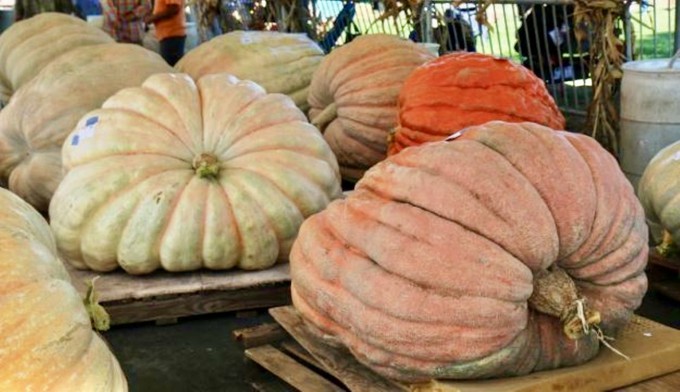
Elk Grove Giant Pumpkin Festival returns Oct. 5 and 6

Extra-extra-extra-large pumpkins will face off in a weigh-off this Saturday in Elk Grove. Photo courtesy Elk Grove Giant Pumpkin Festival
Bring on the giant pumpkins! It’s time for a weigh-off!
This weekend, the Elk Grove Giant Pumpkin Festival returns to Elk Grove Park, headlined by its Giant Pumpkin and Produce Weigh-Off.
Check-in is 7 to 9 a.m. Saturday, Oct. 5; for entrants, advance registration is $10 (including parking and breakfast) or $25 at the gate.
“For 30 years, Elk Grove Park has transformed into the ultimate autumn celebration, attracting pumpkin enthusiasts from far and wide,” say the organizers. “Since 1994, the festival has been a beacon for giant pumpkin growers competing for glory. Over the years, we’ve seen some incredible pumpkins, like the 2,138-pound record-breaker from 2018. Imagine the size of that pie!”
Spectators can watch the actual weighing from 9 a.m. to 3 p.m. with the awards presentation at 4 p.m.
This contest could produce a record breaker. The top contenders will all weigh more than 1,000 pounds. Last year’s heftiest pumpkin nearly topped a ton – 1,940 pounds. The biggest Sacramento County-grown pumpkin (which has its own award): 1,589 pounds.
“Giant pumpkin growers from all over California and beyond will be vying for the top prize – and perhaps a world record – as each of their enormous gourds hit the scale,” say the organizers. “Enter your own produce or pumpkins for a chance to win cash prizes, or cheer from the stands as the monstrous orange orbs are moved with a forklift to a special scale.”
Not just pumpkins will be competing. There also are categories for the heaviest zucchini, watermelon, cantaloupe, tomato, squash and other members of the squash/pumpkin family as well as longest gourd, widest sunflower head and tallest corn stalk.
Judging by last year’s winners, contestants will have to bring some whoppers. Taking home top honors in 2023 were a 3.7-pound tomato, a 220-pound watermelon and a 54.4-pound zucchini.
Meanwhile, the Giant Pumpkin Festival has many other opportunities for people to compete with pumpkins including recipe contests and bake-offs, a pie-eating contest, scarecrow decorating and the always popular pumpkin regatta (where giant pumpkins become canoes for a one-of-a-kind race).
Besides all the pumpkin, the festival features entertainment, music, food trucks, vendors and more. There’s a pumpkin patch, too; take a gourd home!
With free admission, the festival runs 10 a.m. to 5 p.m. Saturday and Sunday, Oct. 5 and 6. Parking is $20, but a bike valet is available free.
Elk Grove Park is located at 9950 Elk Grove-Florin Road, Elk Grove.
For full details including a festival map and contest rules: https://www.cosumnescsd.gov/392/Elk-Grove-Giant-Pumpkin-Festival
Comments
0 comments have been posted.Sacramento Digs Gardening to your inbox.
Food in My Back Yard Series
May 6: Maintain soil moisture with mulch for garden success
April 29: What's (already) wrong with my tomato plants?
April 22: Should you stock up on fertilizer? (Yes!)
April 15: Grow culinary herbs in containers
April 8: When to plant summer vegetables
April 1: Don't be fooled by these garden myths
March 25: Fertilizer tips: How to 'feed' your vegetables for healthy growth
March 18: Time to give vegetable seedlings some more space
March 11: Ways to win the fight against weeds
March 4: Potatoes from the garden
Feb. 25: Plant a fruit tree now -- for later
Feb. 18: How to squeeze more food into less space
Feb. 11: When to plant? Consider staggering your transplants
Feb. 4: Starting in seed starting
Sites We Like
Garden Checklist for week of May 11
Make the most of the lower temperatures early in the week. We’ll be back in the 80s by Thursday.
* Plant, plant, plant! It’s prime planting season in the Sacramento area. Time to set out those tomato transplants along with peppers and eggplants. Pinch off any flowers on new transplants to make them concentrate on establishing roots instead of setting premature fruit.
* Direct-seed melons, cucumbers, summer squash, corn, radishes, pumpkins and annual herbs such as basil.
* Harvest cabbage, lettuce, peas and green onions.
* In the flower garden, direct-seed sunflowers, cosmos, salvia, zinnias, marigolds, celosia and asters. (You also can transplant seedlings for many of the same flowers.)
* Plant dahlia tubers.
* Transplant petunias, marigolds and perennial flowers such as astilbe, columbine, coneflowers, coreopsis, dahlias, rudbeckia and verbena.
* Keep an eye out for slugs, snails, earwigs and aphids that want to dine on tender new growth.
* Feed summer bloomers with a balanced fertilizer.
* For continued bloom, cut off spent flowers on roses as well as other flowering plants.
* Add mulch to the garden to maintain moisture. Mulch also cuts down on weeds. But don’t let it mound around the stems or trunks of trees or shrubs. Leave about a 6-inch-to-1-foot circle to avoid crown rot or other problems.
* Remember to weed! Pull those nasties before they set seed.
* Water early in the day and keep seedlings evenly moist.